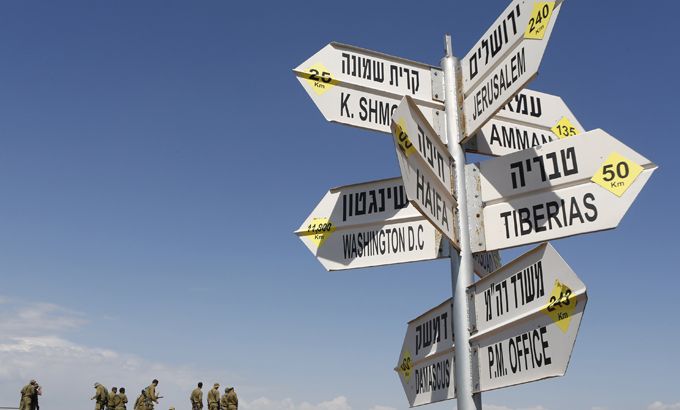
Syria: Exploding beyond its borders
As Israel is accused of carrying out attacks in Damascus, we look at the political and military impact on the region.
Israel is accused of airstrikes on military targets near Syria’s capital but western sources defend the action saying the objective was to destroy Iranian-made missiles destined for Hezbollah in Lebanon.
”We,
. In the future if we seek any help from our friends, Israel will not be on the list of friends. “]
The conflict in Syria is now in its third year, and well across the country’s borders – into Turkey, Iraq and Jordan, Lebanon – and now involving Israel and Iran.
The Syrian government is blaming Israel for carrying out airstrikes on a military and scientific research centre near the capital Damascus. A government statement read:
“Israel committed an aggressive attack on Syria using missiles to attack military facilities in violation of all international laws; violating all commitments in concern. The government of Syria affirmed that this aggression opened the door to all possibilities; especially it reveals the links between hardline religious groups and Zionists. Syria’s government affirmed a long time ago this link between these two groups, the hardline ideology and Zionism.”
But while Israel has made no official comment, its actions were defended by the US.
Tel Aviv declined to confirm the attack so as not to pressure Syrian President Bashar al-Assad into serious retaliation, according to a confidant of Benjamin Netanyahu, Israeli prime minister. Israel also deployed two batteries of its Iron Dome rocket defence system to the north of the country. It described the move as part of “ongoing situational assessments”.
Witnesses say three locations were hit, on the northern outskirts of the capital – some 15km from the Lebanese border.
These included the Qasioun mountain, which was housing military brigades and arms depots; the Republican Guards Brigades at Wadi Barada; and a civil and military research centre in Jamraya
It is the second attack in days, and the third since January of so-called stand-off attacks on Syria, carried out from Lebanese airspace.
Syria has real friends in the region and the world. And they will never allow Syria to fall to the hands of the United States, Israel or extremist groups. They will never allow it. You may ask how will this happen. The details will come.
Sources in the West say Israel is targeting Iranian missiles and weapons bound for Lebanon’s armed group Hezbollah. But there are suggestions too that the research facility is also involved with work on chemical weapons.
Israel remains technically at war with Lebanon and Syria.
It captured Syria’s Golan Heights during the 1967 Middle East War, building settlements and annexing the land.
And in 2006, Israel fought a 34-day war with Hezbollah and other Lebanese militias. Since then, Israel has accused Hezbollah of stockpiling thousands of missiles, supplied through Syria.
Members of the Hezbollah are reported to be fighting on the side of Syria’s government against rebel forces. And just last week, Hassan Nasrallah, the group’s leader, warned that Hezbollah stands ready to come to Syria’s aid.
Meanwhile, the US has warned that Syria would cross what it called a “red line”, if it resorted to using chemical weapons. But President Obama is still urging caution.
“We now have evidence that chemical weapons have been used inside Syria, but we don’t know how they were used, when they were used, who used them; we don’t have chain of custody that establishes what exactly happened,” said Obama.
“And when I am making decisions about America’s national security and the potential for taking additional action in response to chemical weapon use, I’ve got to make sure I’ve got the facts.”
To discuss this and more on Inside Story, with presenter Jane Dutton, are guests: Salah Mubarak, a member of the Syrian National Council; and Richard Weitz, the director of the Center for Political-Military Analysis at the Hudson Institute.
|
“As far as we can tell, they [the attacks] were directed against those weapons that could be used against Israel – specifically long-range weapons that Syria could transfer to Hezbollah. Some of the attacks might have been more for demonstration – a warning for the regime that if it begins to collapse, one scenario is that it might try and flee into Lebanon with their weapons and this was just a a warning not to bring cetain sensitive weapons along.” Richard Weitz, director of the Center for Political-Military Analysis at the Hudson Institute |